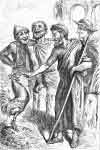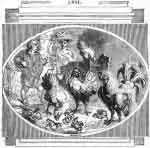Neighbors watched Aesop examine a group of poultry in a yard. He observed to them that mankind was often no better: crowing and poorly scratching.
Mankind is often no better than animals.

JBR Collection
The populace of the neighbourhood in which Aesop was a slave, one day observed him attentively overlooking some poultry in an enclosure that was near the road-side; and those speculative wits who spend more time in prying into other people’s concerns to no purpose than in adjusting their own, were moved with curiosity to know why this philosopher should bestow his attention on those animals. “I am struck,” replied Aesop, “to see how mankind so readily imitate this foolish animal.” “In what?” asked the neighbours. “Why, in crowing well and scraping so ill,” rejoined Aesop.

Northcote
[Note: The Northcote fable is the same fable as in the JBR Collection above. Only the illustrations and Application associated with the fable in the Northcote book are displayed here.]
Application
It is certainly by far more easy, and much more agreeable to most men to talk boldly, and make a noisy boast of their merits and professions, than it is to act nobly or to demonstrate worth by palpable acts, for were we to take every man’s word in proof of his own excellence, we might fancy ourselves in a blessed society, nor wish for any other paradise; but a man who knows the world does not so much regard what another may say, but directs his attention to what he is doing.
It is very bad policy to boast before we act, because it is apt to make us despair of being equal to our promise, and this damps ardour of action. Fame and an illustrious name ought to be the followers and consequence of great and extraordinary acts, and we should not by false pretences or boastings endeavour to raise a name to which we have no just right, and cannot sustain or make good by our actions. J. N.

